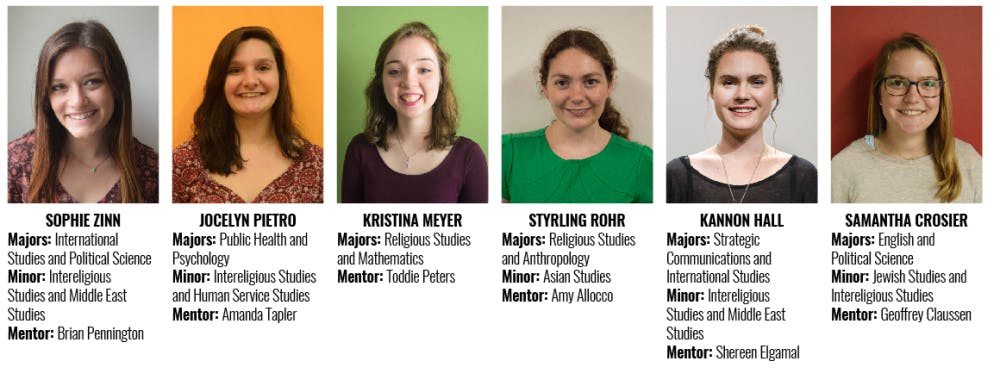Elon University sophomore Sophie Zinn considers herself the person in her friend group that is constantly encouraging others to talk about religion, a subject she is very passionate about and believes is not talked about much.
“It’s not really in the public sphere of college life or America in general as something that’s positive,” Zinn said. “I think there are a lot of positive elements to religious dialogue and learning from other people’s interest and faith traditions.”
Zinn was raised Jewish and has been practicing Buddhism for four years. She does not identify with one main religion, but bases her experiences more on her religious studies experiences learning why various religious traditions matter to those who do not follow them.
Zinn, along with five other sophomores at Elon University, was recently selected to be part of Elon’s first cohort of Multi-faith Scholars. The program combines academic coursework, undergraduate research and community engagement in multi-faith contexts. The students selected receive $5,000 annually in their junior and senior years to assist them in their development as engaged multi-faith leaders.
The idea of this program sprouted from the 2015 Multi-faith Strategic Plan of the Elon Center for the Study of Religion, Culture and Society, which advocated for the development of this program. A $100,000 grant from the Arthur Vining Davis foundation supported the establishment of the program.
“I think that our society has stigmatized religion as something that’s private and something that shouldn’t be talked about,” Zinn said. “However, because we have suppressed our religious identities in our country, we haven’t been able to interact on more personal levels with each other.”
Amy Allocco, associate professor of religious studies and director of the Multi-faith Scholars program, said that the money from the grant will be used to underwrite the program during its first years, and then the university will assume its funding.
Allocco said that the goal of the program is to be interdisciplinary. It stretches across the whole university, and its first cohort is composed of students with a variety of majors, backgrounds and research topics.
“We are privileging students who are not otherwise cohorted,” Allocco said. “This is a great opportunity for students who wouldn’t otherwise have a research platform to get involved in this.”
A requirement to be admitted to the Multi-faith scholars program is to be a religious studies major or interreligious studies minor. Though its first cohort ranges from students majoring in public heath, English, strategic communications, religious studies and international studies.
“Students who have multi-faith commitments will have the opportunity to pair classroom learning and a closely mentored undergraduate research experience with engagement outside of the university, with our local communities and use those three building blocks intersectionally,” Allocco said.
Sophomore Kristina Meyer, who is in the program’s first cohort along with Zinn, says she chose to apply to the program not only because of her interest in doing research with interfaith organizations, but also because she finds building relationships with her cohort as a valuable aspect of her experience.
“We each have different research topics,” Meyer said. “But the fact that we are engaging in multiple religions and engaging with people of multiple religions, we will be able to challenge each other and offer each other different perspectives.”
This two-year program requires the selected scholars to pursue their projects closely with faculty mentors. It also requires the students to engage with the local communities to promote multi-faith learning and diversity. During their first year, the scholars will work with their mentors to plan global engagement opportunities as well as research experiences that will assist in broadening their development as multi-faith leaders. During their senior year, they will take leadership roles on campus within different departments and lead educational events focused around religion.
Zinn hopes to gain a wider perspective of individual experiences, not only from her cohort, but also from those she engages with in the community.
“I think a lot of the times it’s easy to associate different religions with particular belief systems or practices,” Zinn said. “But when it becomes more personal, I think that people’s convictions of others religions deteriorate.”
For Meyer, learning from other religions has made her more compassionate.
“I found that studying other religions and studying how people interact has strengthened my own faith,” Meyer said.
Meyer and Zinn are excited to see the expansion of the program and learn more about what they will be doing with their cohort and in their individual research projects.
Allocco hopes for the scholars to bring the communities they engage with outside of Elon back to campus to facilitate conversations within the student body. She wants to see increased communication between religious communities at Elon, and believes the scholars can change the conversation about religion at Elon. Her first meeting with the cohort will be Thursday, May 4. She hopes this meeting will serve as the “launching pad” for the cohort that she is looking to build.
“I hope we support one another in the challenging kinds of projects,” Allocco said. “Share resources and cheer one another along and ask hard questions to one another as we dig into these research projects and topics.”


